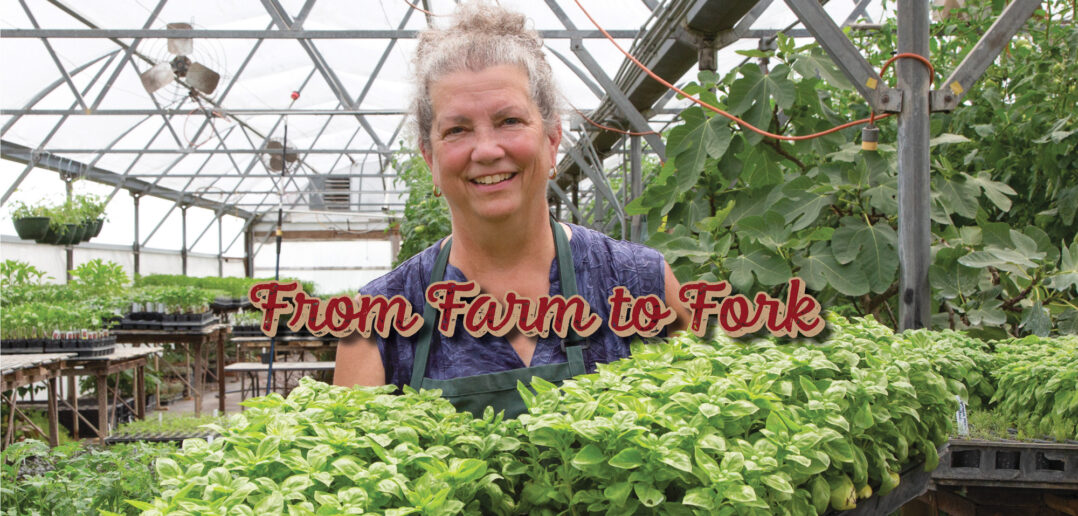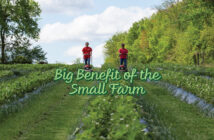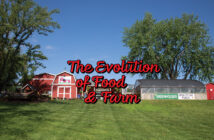| story by | |
| photo by | Steven Hertzog |
| OPEN A PDF OF THE ARTICLE |
The Lawrence community is surrounded by myriad farms that produce the fresh foods that pop up not only at the farmers market but also on the plates in local restaurants.
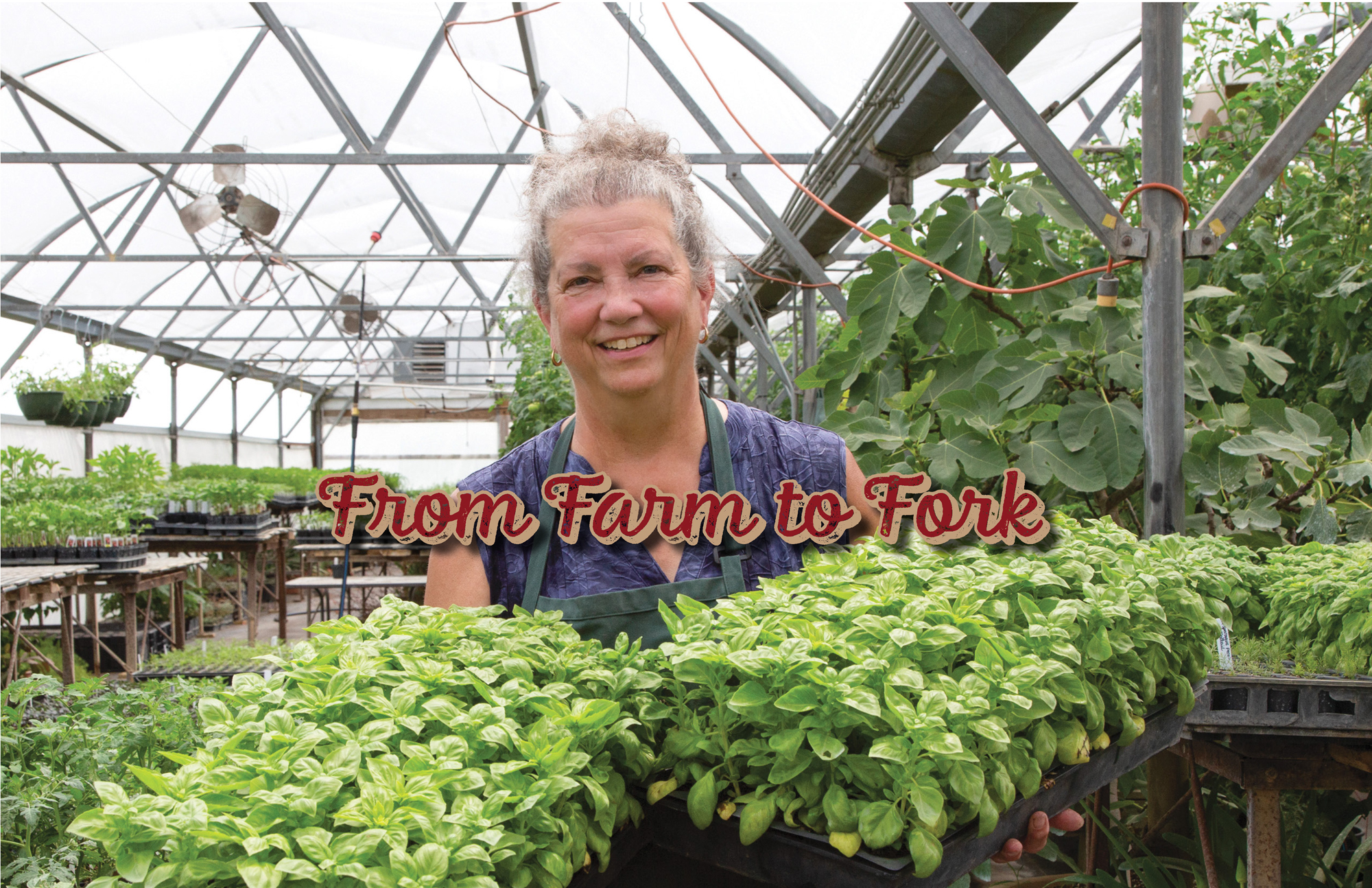
Karen Pendleton displaying basil plants in the green house.
During asparagus season, Pendleton’s Country Market works with a lot of restaurants. That might have something to do with the fact that they have a whopping 15 acres of the crop. When you consider that the farm started with just a half-acre and 1,000 plants in 1980, that is, as owner Karen Pendleton dryly puts it, a “fair amount of asparagus.”
There’s a huge difference between farm-fresh asparagus and asparagus that is shipped in from California, she adds.
“Asparagus, tomatoes, sweet corn—those three things are difficult to ship with good results,” Pendleton says. “The difference between a local, freshly harvested asparagus is night and day compared to what would be shipped in.”
Despite the amount of asparagus the Pendletons sell during the season, they’re so busy, they can’t take on any more restaurants than they already have. And even those—Free State Brewery, Limestone Pizza and Merchants Pub & Plate, with an occasional add-on—are required to go out to the farm and pick it up, because the Pendletons don’t have the time to take it into town.
“If we were delivering vegetables all season long, we’d have a delivery thing set up,” Pendleton explains. “But we’re only doing this for six weeks out of the year, so they have to come pick up their own asparagus.”
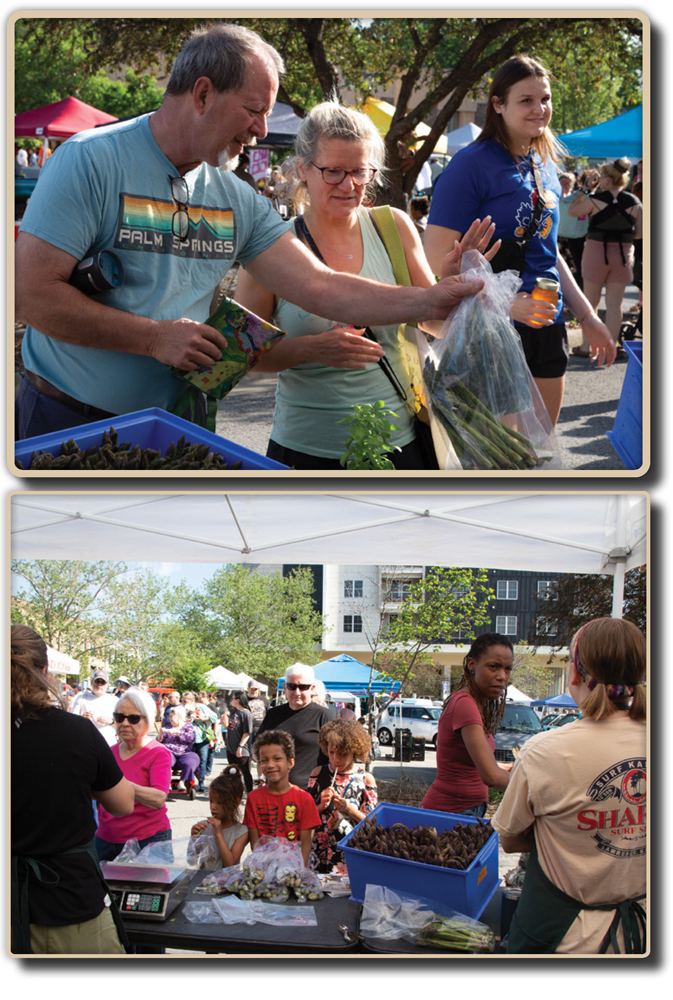
Customers surround the Pendleton Country Market at the Lawrence Farmers Market.
In addition to their own store east of town, Pendleton’s produce can be also found at the downtown farmers market, but well over half of their vegetables are sold through Pendleton’s Community Supported Agriculture program (CSA), in which subscribers get a weekly box of produce.
“We have 150 families that we feed with produce every week from the second week of May ’til the end of September,” Pendleton says of their CSA. Additionally, that subscription includes a copy of Pendleton’s CSA recipe book, which provides invaluable tips for cooking some of those vegetables with which subscribers might not be familiar.
“Most people know what to do with sweet corn, lettuce, that sort of thing,” Pendleton offers. “So we have a lot of recipes in there that would include things like kohlrabi and eggplant and okra—the things that people aren’t quite as familiar with on a regular basis.”
Recipe for Success
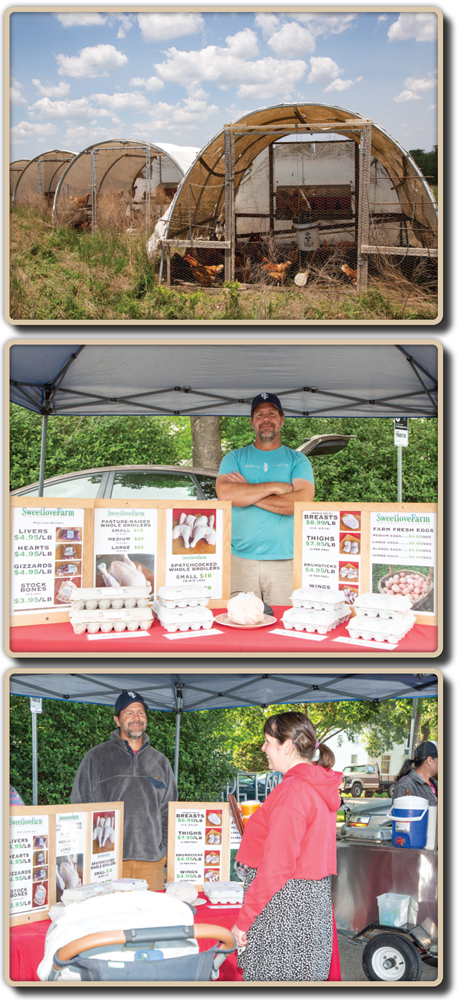
Pasture-based Chicken Coops at SweetLove Farms. Phil Holman-Hebert, at his LFM stand.
Phillip Holman-Hebert, owner of Sweetlove Farm, also provides recipes. But what comes from his plot of land, just west of Oskaloosa, is likely more familiar to the average cook—his pastured poultry, raised for both eggs and meat. To anyone who’s had his birds, be it to cook themselves purchased from Leeway Butcher or the farmers market, or on the menu at Merchants and Kansas City’s Fox and Pearl, there’s a noticeable difference in quality and taste.
Sweetlove’s specialty comes from Joel Salatin, author of “You Can Farm: The Entrepreneur’s Guide to Start & Succeed in a Farming Enterprise,” among many other books.
“He is the probably the strongest voice advocate of the type of farming we do up here, which is referred to as grass farming or pasture-based farming,” Holman-Hebert says. “We’re trying to integrate the raising of livestock naturally into the ecosystem of a grassland. Salatin was the primary national voice and proponent of this new way of thinking about farming.”
Salatin started advocating for this style of farming back in the late ’80s and early ’90s, and Holman-Hebert got familiar with him when he started reading Salatin’s books in the later ’90s, just as he was getting ready to start his farm. His books were largely manuals for beginning farmers on how to raise pastured poultry and pastured cattle for beef profitably.
“That seemed like a good place to start,” the farmer explains, saying that he and his family chose to go with chicken because, for a complete startup like they were, they required the least expense and the smallest amount of infrastructure. “You can start with just a few animals and then gradually grow your way up to many more”
Cattle and other big animals require big infrastructure like good fencing or sorting and handling facilities, and they take longer to get from calf to food.
“The chickens just seemed like the right place to start for a complete novice in terms of scale and handling, and short time from start to finished product,” Holman-Hebert says. It was still a few years after the farm started raising animals in late 2005 before they started selling to restaurants.
“When we started out, we were just processing the chickens ourselves here on the farm in small batches—40 or 50 birds at a time,” he says. “That way of processing chickens doesn’t allow you to sell to restaurants and grocery stores, or other outlets like that.”
In 2008, Sweetlove started taking their birds to the USDA processing plant in Garnett and getting them processed there, which allowed the farm to sell to a wider array of outlets like the farmers market and restaurants. Then, in 2010, Sweetlove got their first restaurant client, TK Peterson, who at the time was executive chef at the Oread Hotel and trying to get more local produce and local sources for their kitchen. A year or so after that, Peterson and his wife, Emily, opened Merchants, and they’ve remained Sweetlove’s longest-running client.
“I think they’re dealing with us because of some distinctive things that we do,” says Holman-Hebert when asked just why these chefs and restaurateurs use Sweetlove chicken. “One is, these animals live in the pasture, and what the pasture does allow them to have is a variety of wild seeds, quite a variety of green plants, and they do eat the green plants’ leaves, stems, flowers, seeds, etc.”
LOCAL MATTERS
Our Local Advertisers – Making a Positive Impact
The micronutrients and microflavonoids the chickens get from that environment, he adds, are different than they would be if they were just getting a purchased ration—although that is the bulk of the protein the birds receive. Combined with Sweetlove’s diligent approach to rebuilding the soil of his farm, the chickens are exposed to full, rich populations of microbial life in the soil.
Add in an extra week of growth time before the birds head to market, and Sweetlove chicken is well worth the added cost, Holman-Hebert says.
“We have to deal with the reality that chicken, in general, in the marketplace is ubiquitous, and it’s cheap; and it’s cheap and ubiquitous because the industrial methods of raising it have made it that way,” the farmer continues. “In a restaurant setting where the cost of a plate is really, really tightly monitored, and they really have to make the most they can out of every dish they serve, the economics of that are very difficult for most restaurants to manage a product as expensive as ours.”
This means Sweetlove works with chefs that are really committed. A plate of the farm’s chicken at Merchants or a smoked chicken at Fox and Pearl may be expensive, but those chefs recognize the quality and want that to be the reputation of the restaurant, so they have committed to paying more.
“It’s better business for us to sell directly to customers for a lot of reasons,” Holman-Hebert continues. “One is just the economics of it, but I got in business because I love to eat, and I love food. I love sharing that with people. I love the fact that I know the people that are eating my food. That’s the richest and most rewarding part of my business. I know what they look like. I know who they are. Farmers market. Those are really, really rich relationships, and so aside from the economics, those connections are just fantastic.”
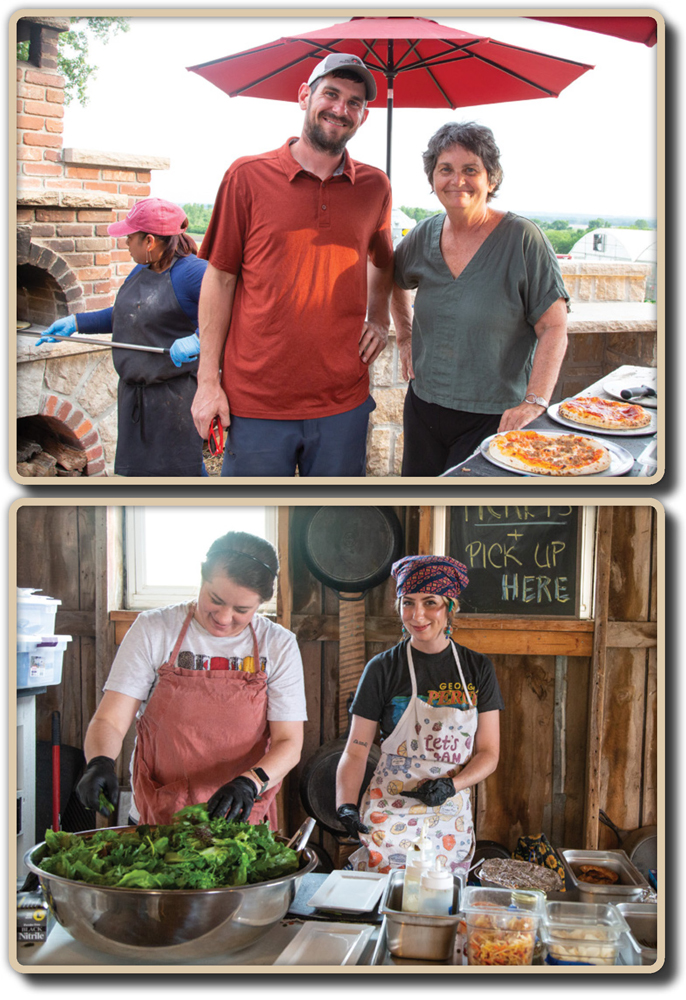
Scott and Nancy Thellman together at their outdoor pizza oven. Sous chefs prepare the dishes at the Juniper Hills Farm pizza nights.
From Farm to Pizza
Somewhere in the middle between a producer like Pendleton’s or Sweetlove is Juniper Hill Farm & Table. Located north of the Lawrence airport, the converted barn at Juniper Hill Farm offers weekly pizza nights on Thursdays in the spring, summer and early fall, along with occasional chef’s table dinners curated by celebrated local culinary artisans.
Although it only opened as a venue in September 2022, Juniper Hill’s pizza nights quickly became a hot-ticket item last fall. It’s not surprising, says owner Nancy Thellman.
“It’s kind of a magical mix, because it brings people out to a farm, gets them to feel somehow connected with the farmer and that land, which is important, feeds them well,” she explains. It’s rather surprising how big this has become, and all because of an article her daughter, Katy, sent her from The New York Times.
“It was just like an instantaneous way to see something to do, because I didn’t have my job,” says Thellman, who spent 12 years as a Douglas County commissioner. “I wasn’t old old. I’m old, but I’m not ready to sit on the front porch forever. So we ended up deciding to work on the barn some and see if we could make it into a venue that would be nice for the family but could also be passable as a real business.”
One thing led to another, and what originally was going to be Thellman putting a few bricks together and calling it a pizza oven, and having it really rustic and super-simple changed, as does everything the Thellmans put their mind to at Juniper Hill.
“Everything we do out here luckily turns into pretty serious work,” Thellman explains. Her husband, Scott, known as “Old Scott” as opposed to their son, “Young Scott,” who runs the farm, wired everything up and did a lot of carpentry and some plumbing. Then Thellman laid the floors and brick in the barn.
“These used to be dusty gravel floors,” she says, gesturing to the laid brick just outside the room in which we’re speaking. “I did the brick work in the sidewalk and then the patio. All that stuff. It was just like every day there was something serious to do and exhausting, which was really good. You can see, literally, brick by brick, the progress. It’s slow and tedious, but for me, it was just magical.”
It’s a lovely new adventure for her, Thellman says, to have a whole different career at the age of 65. During her time on the county commission, one of the driving things behind her was to try to elevate family farms and get people to appreciate how lucky we are in Douglas County to have farms of all types encircling the community.
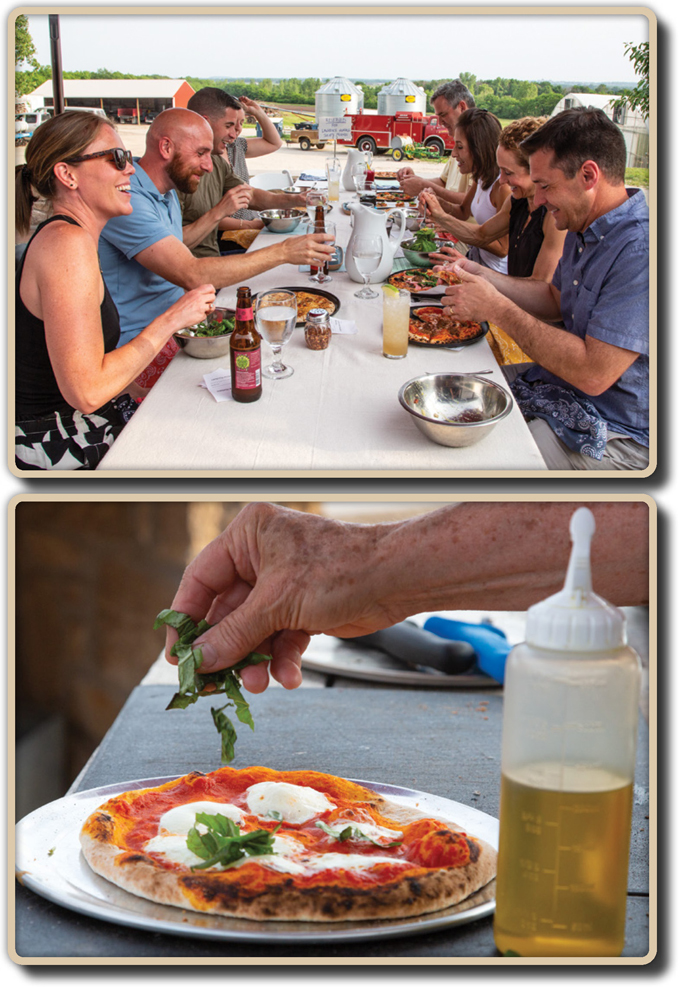
Lawrence Human Society Friends enjoy dining outdoors at Juniper Hills Farm.
“They provide beauty and space, and a pretty big part of the Douglas County economy,” she says. “Even more than that, some of the farms around Lawrence provide actual food. Not just the commodities which are super important, like corn and soy, but fruits and vegetables, and goat farms for cheese and dairy, and all the things you go to the grocery store for.”
Many of these farms now are filling some of the shelves at the grocery store or bringing tons of food to the farmers market each week, and that’s important, Thellman explains.
“In our farm’s case, because of [Young] Scotty’s work and his fabulous crew, they’re providing to many of the restaurants and several of the grocery stores here,” she says with pride. “A lot of the Whole Foods stores in Kansas City, restaurants in Kansas City, wholesale businesses in Kansas City, that then distribute some of their product all the way up to Michigan.”
For all the distribution the farm sees, it’s the farm-table aspect of Juniper Hill that Thellman sees as important for the connections to the immediate community. Some of that food gets to stay right there, and people get to experience a pizza that’s made with tomato sauce from tomatoes grown within sight of where the pizza is being made.
“You can talk to the guys who actually put the plants in the ground and kept them going and harvested them,” Thellman relates. “Part of the crew who does the really hard work is often here continuing the hard work to put those pizzas together, and I think they appreciate that full-circle experience.”
If there’s a seasonal squash or something that makes a good white vegetable sauce, that happens, as well. Many of the toppings are just fresh produce off the farm, she explains.
“And if our farm doesn’t grow it, then we’ll do everything we can to buy from other local farms and support their business, too,” Thellman says. It’s a beautiful thing to be around and see this shift in Kansas, she adds.
“In Kansas—in this place,” she says. “It’s a remarkable adventure.”

